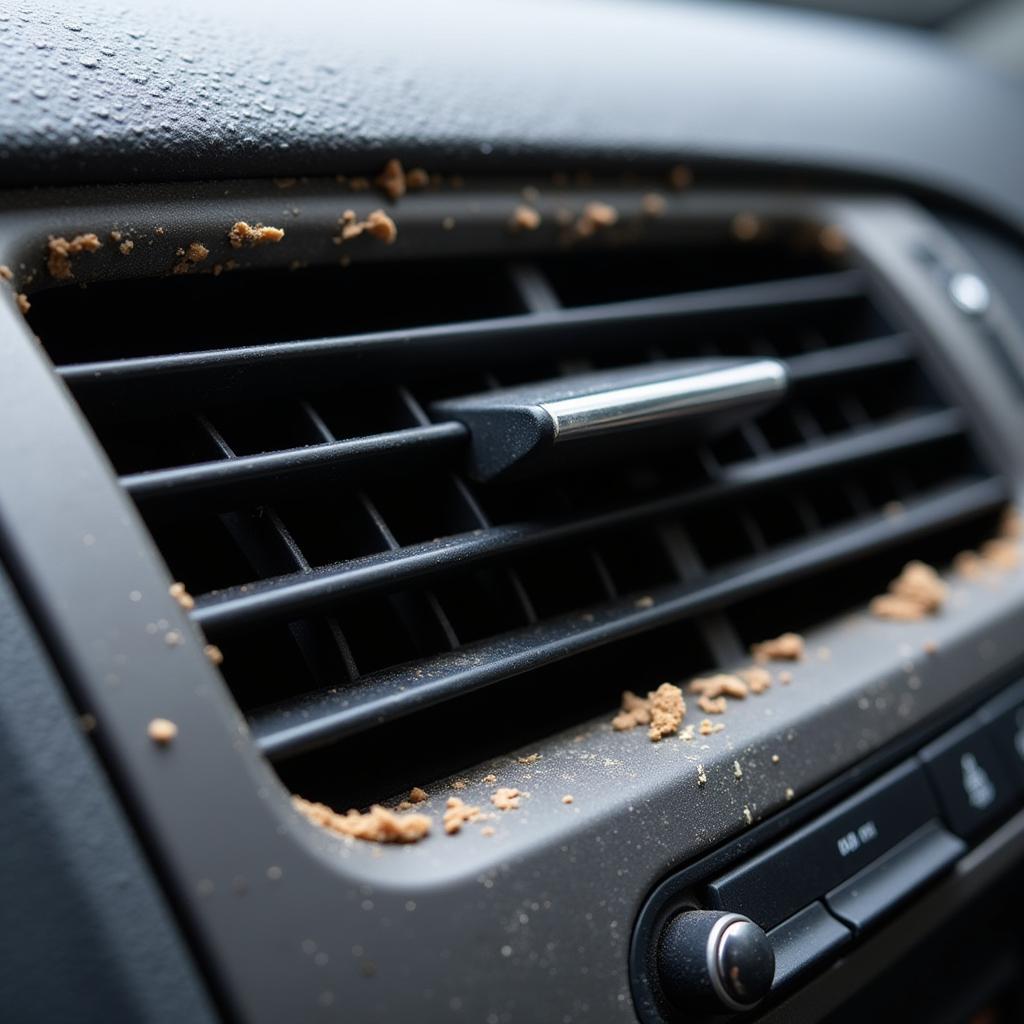Keeping your car cool during the summer months is essential for a comfortable driving experience. When your car’s air conditioning system isn’t working correctly, it can make even a short drive unbearable. Fortunately, many air conditioning problems can be diagnosed and fixed without a trip to the mechanic. This comprehensive guide will walk you through common air con issues, how to troubleshoot them, and when to call in a professional.
 Car AC not working
Car AC not working
Understanding Your Car’s Air Conditioning System
Before we dive into troubleshooting, it’s helpful to understand the basic components of your car’s AC system:
- Compressor: This is the heart of the system, compressing and circulating refrigerant.
- Condenser: Located at the front of your vehicle, the condenser cools the refrigerant and converts it from a gas to a liquid.
- Evaporator: Positioned inside the dashboard, the evaporator absorbs heat from the cabin air as the refrigerant evaporates back into a gas.
- Receiver/Drier: This component stores refrigerant and removes moisture.
- Expansion Valve: The expansion valve regulates refrigerant flow into the evaporator.
Common Air Conditioning Problems and Solutions
Here are some common car air conditioning problems and how to address them:
1. Air Conditioning Not Blowing Cold Air
This is often the first sign of an issue. Several factors could be at fault:
- Low Refrigerant: Refrigerant naturally depletes over time. A leak will accelerate this process. Fixing air conditioning in car cost uk can vary depending on the severity of the leak and the type of refrigerant used.
- Clogged Condenser: Debris like leaves and dirt can restrict airflow, reducing cooling efficiency.
- Faulty Compressor: If the compressor isn’t engaging, the refrigerant won’t circulate.
- Electrical Problems: A blown fuse or faulty relay can disrupt power to the AC system.
Troubleshooting Tips:
- Check the pressure of your AC system using a gauge set.
- Visually inspect the condenser for blockages and clean it if necessary.
- Listen for the compressor clutch engaging when you turn the AC on.
2. Weak Airflow
Weak airflow from your vents can be due to:
- Clogged Cabin Air Filter: A dirty cabin air filter restricts airflow into the system.
- Blocked Vents: Make sure none of your vents are closed or obstructed.
- Blower Motor Issue: A failing blower motor can result in reduced airflow.
Troubleshooting Tips:
- Replace your cabin air filter regularly (check your owner’s manual for recommended intervals).
- Inspect vents for obstructions and adjust them as needed.
- If you suspect a blower motor problem, it’s best to consult a mechanic.
 Car air conditioning vent blowing weak air
Car air conditioning vent blowing weak air
3. Air Conditioning System Makes Noise
Unusual noises from your AC system could indicate:
- Worn Compressor: A failing compressor can make grinding or squealing noises.
- Loose Belts: Worn or loose belts connected to the compressor can cause a chirping sound.
- Defective Blower Motor: A failing blower motor can produce humming or rattling noises.
Troubleshooting Tips:
- If you suspect a compressor issue, it’s crucial to have it inspected by a professional.
- Check the tension and condition of the belts.
- Listen carefully to the location and type of noise to help pinpoint the source.
 Mechanic inspecting car AC compressor
Mechanic inspecting car AC compressor
4. AC Smells Musty
A musty smell usually indicates mold or mildew growth within the system, often in the evaporator.
Troubleshooting Tips:
- Run the AC on high with the windows down for a few minutes to air out the system.
- Use an AC disinfectant spray or have the system professionally cleaned to eliminate mold and mildew.
When to Seek Professional Help
While some AC issues can be resolved with DIY fixes, it’s important to recognize when professional help is necessary. If you encounter any of the following, it’s best to consult a qualified mechanic:
- Suspected refrigerant leaks
- Compressor problems
- Electrical system malfunctions
- Complex repairs beyond your skill level
Fix my ac in car: Preventive Maintenance is Key
Regular maintenance can help prevent costly AC repairs and keep your system running efficiently. Here are some preventive measures:
- Regular Inspections: Have your AC system checked annually by a mechanic, especially before the summer months.
- Refrigerant Recharge: Recharge your AC system every 2-3 years or as recommended in your owner’s manual.
- Cabin Air Filter Replacement: Change your cabin air filter at least once a year or more frequently if you live in a dusty or polluted area.
- Keep it Running: Run your AC system for a few minutes every couple of weeks, even during the winter, to keep the components lubricated and prevent seals from drying out.
Conclusion
A properly functioning air conditioning system is vital for comfortable driving, especially during hot weather. Car air conditioning fix can be straightforward or complex, ranging from simple filter replacements to involved compressor repairs. By understanding the basics of your AC system, performing regular maintenance, and knowing when to seek professional help, you can ensure a comfortable ride for miles to come. If you’re unsure about any aspect of your car’s air conditioning, don’t hesitate to contact the experts at AutoTipPro at +1 (641) 206-8880 or visit our office at 500 N St Mary’s St, San Antonio, TX 78205, United States. We’re here to help!





Leave a Reply